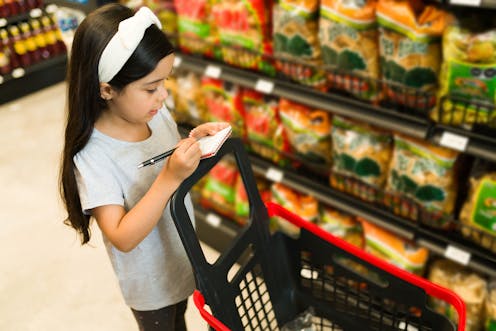How getting kids to make grocery lists and set the table can improve their vocabulary and willingness to learn
- Written by Diana Leyva, Associate Professor of Psychology, University of Pittsburgh

Reading, writing and math are often thought of as subjects that children learn in school. But as a psychologist who researches[1] how families can help support learning at home[2], I have found that children can also learn those skills through everyday tasks and chores. One of these chores is preparing a meal – everything from grocery shopping and cooking to setting the table and enjoying the meal.
Our research shows this is especially true for Latino families[3] living in the U.S., many of whom are new to school systems in the U.S. but for whom family dinners are a central part of the day.
Our study included 248 Latino parents with kids in kindergarten. Some parents were given a set of tips – described below – on how to support children’s language, literacy and math at home while selecting, preparing and eating food. Parents were asked to use these tips for at least a month. Other parents were not given these tips.
Our study found that the children whose parents were given these tips had larger vocabularies and more motivation to learn[4] both one month after using the tips and even five months later. These children were also better storytellers and were better able to control their behavior and pay better attention compared with children whose parents were not given these tips.
Busy parents in particular loved these tips[5] because they were easy to follow and to fit into their regular schedules and did not require extra work or special materials.
1. Make grocery lists
Parents can ask their children to write out the grocery list before they go food shopping. While older children can use letters and numbers – for example, “2 cereal boxes, 10 bananas,” younger children might be encouraged to draw pictures of the items their parents want to buy or to use a combination of letters, numbers and pictures.
A 2017 study found that the more parents let their children try out writing and reading letters and numbers on their own while making grocery lists, the better the children’s reading and math skills[6] are later.
Once back from the store, parents can ask children to use their grocery list to check whether the parents bought everything on the list. This is a great way for children to practice writing, reading and math.
2. Cooking and setting the table
Gathering and mixing the ingredients for cooking or setting the table are opportunities for kids to practice math[7] in a playful and familiar way. We found that practicing math with children during these household chores can also increase kids’ motivation to learn math[8].
Ask your child questions such as: Can you get five apples from the fridge? I added 4 cups of milk plus one more – how many are there in total? How many plates and forks do we need today?
3. Tell stories at mealtime
Parents can use family dinner and other meals to encourage children to tell stories about their day. Telling stories about past or future events is a great way to build skills like vocabulary and story comprehension[9] that are needed to read.
To get children to talk, parents should use lots of questions that require children to come up with their own answer rather than simply responding with a “yes” or a “no.” For example: Who came with you to the party? Where did you go with Grandma? Why were you scared?
Talking about topics that the child cares about can also help parents get children to talk. To keep the child engaged in the conversation, parents can ask follow-up questions like “And then what happened?” They can also repeat back what the child says[10]. For example, if the child says “We went to the park,” the parent might respond “That’s right, we went to the park!” and use phrases such as “Uh-huh,” “Oh,” “I didn’t know that” and “Really?” to keep the conversation going.
4. Use the language that’s most comfortable
Parents should feel free to talk in the language they know best. Many parents might feel pressured to speak in one language - such as English – at home because this is the language used in school. However, when parents speak in the language they are most familiar with, they are better able to express their thoughts and feelings while also preserving their culture. Speaking a native language at home is not detrimental to children’s learning. When children have strong foundations in one language – such as Spanish – they can use that knowledge as a building block for learning a second language[11] – such as English.
Our research is based primarily on Latino families, who place particular value on family meals. Latino families tend to eat together more often[12] than families from other ethnicities. They are also more likely to cook at home and involve children in kitchen chores.
However, these tips apply to all families who regularly cook, eat and shop for food together. And they can help busy parents support their young children’s learning without much added burden or spending.
[Like what you’ve read? Want more? Sign up for The Conversation’s daily newsletter[13].]
References
- ^ psychologist who researches (psychology.pitt.edu)
- ^ support learning at home (foodforthought.pitt.edu)
- ^ especially true for Latino families (doi.org)
- ^ larger vocabularies and more motivation to learn (doi.org)
- ^ loved these tips (doi.org)
- ^ better the children’s reading and math skills (www.sciencedirect.com)
- ^ practice math (dreme.stanford.edu)
- ^ increase kids’ motivation to learn math (doi.org)
- ^ great way to build skills like vocabulary and story comprehension (doi.org)
- ^ repeat back what the child says (doi.org)
- ^ building block for learning a second language (eric.ed.gov)
- ^ more often (www.ncbi.nlm.nih.gov)
- ^ Sign up for The Conversation’s daily newsletter (theconversation.com)
















